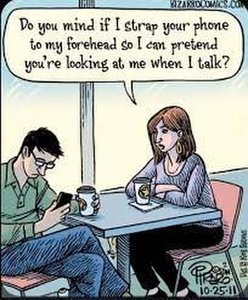I do not possess, and never have possessed, a smartphone. I have resisted buying one because I have no need of the internet when I am not at work or away from home. As it is, I spend far too much time on my two laptops – the ancient Asus parked on my bedroom desk and the Dell I use at school. I am very conscious of the fact that I am not truly living when I am online. By that I mean I am interacting with a mere gadget, not with people or the real world. Virtual reality is a distraction from the true business of living – meeting and talking to people, working, travelling, having adventures, observing and reflecting on the world around us.
I equate time spent online with time spent reading or watching TV. Reading and are also no substitute for living. The virtual world of the internet or books or TV is best taken in small doses.
It saddens me to see people nowadays looking at their smartphones when they could be talking to other people. A familiar sight is of people sitting silently at a restaurant table, waiting for their food, each
person gazing into a smartphone. What are they looking at? Invariably it is social media – Facebook, Youtube, WhatsApp, Instagram, TikTok, Snapchat. Mostly froth, in my opinion – although there is a time and a place for Youtube.
At school the students carry smartphones, which they are forbidden to use during lessons; laptops only, strictly for school work, is the rule. However, I am constantly telling them off for succumbing to temptation and illicitly using their phones to access the social media and games to which they are addicted.
Since 2007 I have owned a simple cellphone. It allows me to make and receive phone calls and to send and receive SMSes. That is all I want or need when I am not at home or not working. In lessons I sometimes flourish my Nokia, sing its praises, and tell the students that staring at a small screen all day is bad for them. Much better to spend your day talking to real people, I say. They probably regard me as an old fossil.
I suppose it is possible to own a smartphone and use it sparingly. However, the temptation will always be there to check
your email or Facebook page, to pass the time surfing the internet - instead of looking at the world around or initiating a conversation. Also, a smartphone is bigger and more expensive than a cellphone – far less easy to tuck away inside a pocket, far more likely to be stolen.
Surfing the internet is an interesting metaphor. It implies superficiality, skimming the surface of the vast ocean of knowledge and opinion available on the internet. Instead of surfing, we should be diving for pearls – using the internet to locate valuable information or send essential messages.
It has increasingly difficult for this old fossil to survive in the modern world. Smartphones have the norm. Society is geared to smartphone usage. My friend Charles, a Dutchman, tells me that in Holland it is impossible to live without a smartphone. You need apps to do even the simplest things, and to have apps you need a smartphone.
In Vietnam, it is still possible to get by with an cellphone, but not having a smartphone does cause problems.
seemed to be the only person carrying bits of paper; everyone else had some sort of app on their smartphone.
Recently my bank gave me a new debit card. In order to withdraw money from the ATM, I had to set a password. After fiddling about on the internet, I realized I needed a particular app to do this. Not having a smartphone, I was unable to download the app, so I had to go back to my bank, where a woman used her personal smartphone to help me.
These days in Ho Chi Minh City, buying an cellphone is not easy. When my wife asked me last month to buy her one, I visited several shops which had a magnificent array of smartphones but only a tiny number of primitive cellphones. Clearly, the cellphones days are numbered. I ended up buying my wife a sturdy Nokia 110 4G for $30.









